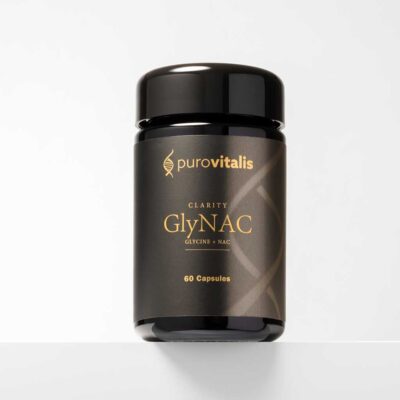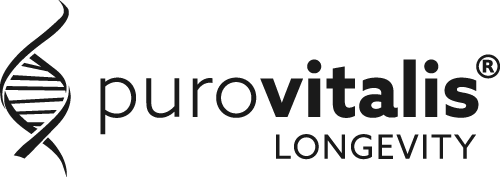
table of contents
Around 14% of adults aged 60 and over live with a mental disorder.
— World Health Organization (WHO), 2023.
Living longer is only meaningful if those extra years are spent in good health—both physically and mentally. Cognitive decline and poor mental health can dramatically reduce a person’s quality of life, independence, and even lifespan. In longevity research, it’s increasingly clear that a healthy brain isn’t just about avoiding memory loss; it’s about preserving clarity, motivation, emotional balance, decision-making and even much more that that. We can think of the brain as the hardware and mental health as the software— those two are tightly connected. If the brain’s structure and function are compromised, emotional regulation and mental resilience suffer too. And the reverse is true: chronic stress and depression can physically affect the brain’s structure, especially in older adults. Supporting both cognition and mental well-being is a growing focus in healthy aging strategies.
One nutritional approach that’s showing promise is GlyNAC—a combination of the amino acids glycine and N-acetylcysteine (NAC)—which may help by restoring important antioxidant levels and supporting mitochondrial function in the brain.
In this blog, we take a closer look at what the science says about GlyNAC and how this combined supplement may support both cognitive and mental health.
Glycine and cognition
Glycine is a small amino acid, but it plays a big role in how the brain works. It helps support learning and memory by working with special receptors in the brain that strengthen connections between nerve cells. This is important for staying mentally sharp as we age.
You could say that glycine helps the brain’s hardware function optimally—by supporting communication between neurons, it strengthens the structural basis for cognitive performance.
Studies show that low levels of glycine are linked to slower thinking and weaker memory in older adults. It’s also connected to insulin resistance, which can further affect brain function. By raising glycine levels, researchers believe we can support clearer thinking and better mental performance.
In a 2021 study, older adults took GlyNAC for 24 weeks. They improved on several thinking and memory tests, including how well they could focus, find words, and switch between tasks. These results suggest that glycine may be a helpful nutrient for keeping the brain working well as we grow older.
Glycine and mental health
Glycine also helps with emotional balance – the software. It interacts with calming pathways in the brain and can reduce overstimulation of the nervous system. That’s why researchers have looked into its effects on anxiety, depression, and even obsessive-compulsive disorder (OCD).
Glycine Modulates Brain Signalling via GPR158
A 2023 study found that glycine affects a specific signaling protein in the brain called GPR158. When glycine binds to this protein, it changes brain signaling and makes nerve cells more active. The researchers also discovered that mice without this protein were less stressed and showed fewer signs of depression. This suggests that GPR158 could play a role in the development of new treatments for depression.
Although scientists are still figuring out exactly how it works, glycine seems to affect glutamate—one of the brain’s most active signaling chemicals. When glutamate is out of balance, it can lead to mood problems and mental strain. In some early studies, glycine has been tested alongside other treatments for conditions like schizophrenia and OCD, with promising results.
Because of its calming effect, glycine may also support better sleep and emotional resilience. Within GlyNAC, glycine doesn’t just help produce antioxidants—it may also play a role in supporting brain chemistry that helps you feel more mentally stable and focused. Over time, this could make it a helpful part of a well-rounded approach to mental well-being.
Interested in how you get get glycin via your diet, read our blog: Glycine food sources
NAC and brain health
N-acetylcysteine (NAC) is best known as a building block for glutathione, which is the body’s main antioxidant. But in the brain, NAC does more than just clean up oxidative stress. It helps protect brain cells from damage and keeps the brain’s energy systems working properly—especially the mitochondria, which act like the cell’s batteries.
What is glutathione?
Glutathione is a substance your body makes to protect cells from damage. It acts as a natural antioxidant, helping to reduce oxidative stress, support the immune system, and keep cells healthy. Levels drop with age, which may affect energy, memory, and overall resilience.
As we get older, oxidative stress increases and brain cells become more vulnerable. This can lead to problems like memory loss and slower thinking. Studies show that NAC can restore balance at the cellular level and help brain cells stay healthy longer.
In the same 2021 GlyNAC study, adults in the age 71–80 years took NAC together with glycine for 24 weeks saw better results on memory and thinking tests. The researchers also found improvements in how well mitochondria functioned. This points to NAC as a key player in protecting the brain against aging—especially when paired with glycine.
NAC and mental health
NAC has also been widely studied for its effects on mental health. It helps, as mentioned, to regulate glutamate levels in the brain, which is important because glutamate is involved in many mood disorders like depression, anxiety, and schizophrenia.
New 2025 Study Supports NAC as Supplementary OCD Treatment
A 2025 study found that people with moderate-to-severe OCD improved more when they took NAC (2,400 mg per day) alongside their regular SSRI medication. After 10 weeks, they had fewer obsessive and compulsive symptoms compared to those who got a placebo. NAC was well tolerated, with only mild stomach-related side effects. The results suggest NAC could be a helpful and safe add-on treatment for OCD.
When glutamate is too active, it can overwhelm the brain and lead to emotional symptoms. NAC helps keep this in check. It’s also been shown to reduce inflammation and oxidative stress in the brain—both of which are often higher in people with mental health challenges. Some studies even suggest that NAC can help improve dopamine activity and support neuroplasticity.
What is Neuroplasticity?
The brain’s ability to change and adapt by forming new connections between brain cells. This happens when we learn something new, recover from injury, or change habits.
Because of these effects, NAC is now being explored as a supportive option for mood-related conditions. When combined with glycine—as in GlyNAC—it doesn’t just help with antioxidant production, but also supports more balanced brain chemistry. That makes it a promising option for mental clarity and emotional well-being.
GlyNAC as part of a healthy aging strategy
At Purovitalis, our GlyNAC supplement is made for people who want to support both mental clarity and emotional balance as they get older. By combining glycine and NAC in the right ratio, it gives your body what it needs to produce glutathione—one of the most important antioxidants for brain protection. But the benefits go beyond that.
In the 2021 human study, people taking GlyNAC for 24 weeks improved not only in memory and thinking, but also in strength and energy. These improvements faded when they stopped taking the supplement, showing how important it is to keep up the routine. A newer randomized clinical trial from 2024 backed this up—GlyNAC helped raise glutathione levels in people with high oxidative stress, which is often seen in aging and chronic health conditions.
GlyNAC by Purovitalis may be especially helpful for people dealing with issues like poor memory, brain fog, low energy, anxiety, or mood swings—especially when these are linked to stress or low antioxidant status. It supports both the structure – the hardware in the brain – and the chemistry including your mood and emotions or as we refer it in this blog – the software – in a natural, science-backed way.
Support your cognitive and mental health and byt GlyNAC today!
Are you not done with knowing more about GlyNAC, then read our blog: GlyNAC and sleep improvement
References
- World Health Organization. Mental health of older adults [Internet]. Geneva: World Health Organization; 2023 Oct 20 [cited 2025 Jul 23]. Available from: https://www.who.int/news-room/fact-sheets/detail/mental-health-of-older-adults
- Díaz-Flores M, Cruz M, Duran-Reyes G, Munguia-Miranda C, Loza-Rodríguez H, Pulido-Casas E, Torres-Ramírez N, Gaja-Rodriguez O, Kumate J, Baiza-Gutman LA, Hernández-Saavedra D. Oral supplementation with glycine reduces oxidative stress in patients with metabolic syndrome, improving their systolic blood pressure. Can J Physiol Pharmacol. 2013 Jun 17;91(10):855–60.
- Kumar P, Liu C, Hsu JW, Chacko S, Minard C, Jahoor F, Sekhar RV. Glycine and N-acetylcysteine (GlyNAC) supplementation in older adults improves glutathione deficiency, oxidative stress, mitochondrial dysfunction, inflammation, insulin resistance, endothelial dysfunction, genotoxicity, muscle strength, and cognition: Results of a pilot clinical trial. Clin Transl Med. 2021 Mar;11(3):e372. PMID: 33783984; PMCID: PMC8002905.
- Grigorova OV, Romasenko LV, Vazagaeva TI, Maksimova LN, Nartsissov YaR. Therapy efficiency of anxiety at patients with adjustment disorder, on glycine therapy model with placebo-sensibility. Russ Psychiatr J. 2012;(4)
- Laboute T, Zucca S, Holcomb M, Patil DN, Garza C, Wheatley BA, Roy RN, Forli S, Martemyanov KA. Orphan receptor GPR158 serves as a metabotropic glycine receptor: mGlyR. Science. 2023 Mar 30;379(6639):1352–8.. PMID: 36996198; PMCID: PMC10751545.
- Cleveland WL, DeLaPaz RL, Fawwaz RA, Challop RS. High-dose glycine treatment of refractory obsessive-compulsive disorder and body dysmorphic disorder in a 5-year period. Neural Plast. 2010 Feb 18;2009:768398. PMID: 20182547; PMCID: PMC2825652.
- Tenório MCdS, Graciliano NG, Moura FA, de Oliveira ACM, Goulart MOF. N-acetylcysteine (NAC): Impacts on human health. Antioxidants (Basel). 2021 Jun 16;10(6):967.
- Bradlow RCJ, Berk M, Kalivas PW, Back SE, Kanaan RA. The potential of N-acetyl-L-cysteine (NAC) in the treatment of psychiatric disorders. CNS Drugs. 2022 Mar 22;36(5):451–82.
- McQueen G, Lally J, Collier T, Zelaya F, Lythgoe DJ, Barker GJ, Stone JM, McGuire P, MacCabe JH, Egerton A. Effects of N-acetylcysteine on brain glutamate levels and resting perfusion in schizophrenia. Psychopharmacology (Berl). 2018 Aug 23;235(10):3045–54.
- Sonia SBA, Rahman MS, Shirin M, Siddiki MNA, Sultana S, Chowdhury IH, Rumu H, Shamsuddoha N. Brain glutamate level after treatment with N-acetylcysteine in obsessive-compulsive disorder patients: A randomized trial. INNOSC Theranostics and Pharmacological Sciences. 2025;8(1):80–90.
- Faghfouri AH, Zarezadeh M, Tavakoli-Rouzbehani OM, Radkhah N, Faghfuri E, Kord-Varkaneh H, Tan SC, Ostadrahimi A. The effects of N-acetylcysteine on inflammatory and oxidative stress biomarkers: A systematic review and meta-analysis of controlled clinical trials. Eur J Pharmacol. 2020 Oct 5;884:173368.
- Hofer SJ, Daskalaki I, Bergmann M, Friščić J, Zimmermann A, Mueller MI, Abdellatif M, Nicastro R, Masser S, Durand S, Nartey A, Waltenstorfer M, Enzenhofer S, Faimann I, Gschiel V, Bajaj T, Niemeyer C, Gkikas I, Pein L, Cerrato G, et al. Spermidine is essential for fasting-mediated autophagy and longevity. Nat Cell Biol. 2024 Aug;26:1571–84.

GlyNAC – Powerful Cellular Synergy Support glutathione production Fuel cellular energy
Experience the proven synergy of Glycine and N-Acetyl-Cysteïne. Together, they work more effectively than alone to restore glutathione levels, enhance mitochondrial function, and reduce oxidative stress.

Track 50+ health metrics with AI-powered accuracy. Start your free trial today and take control of your wellness journey!













